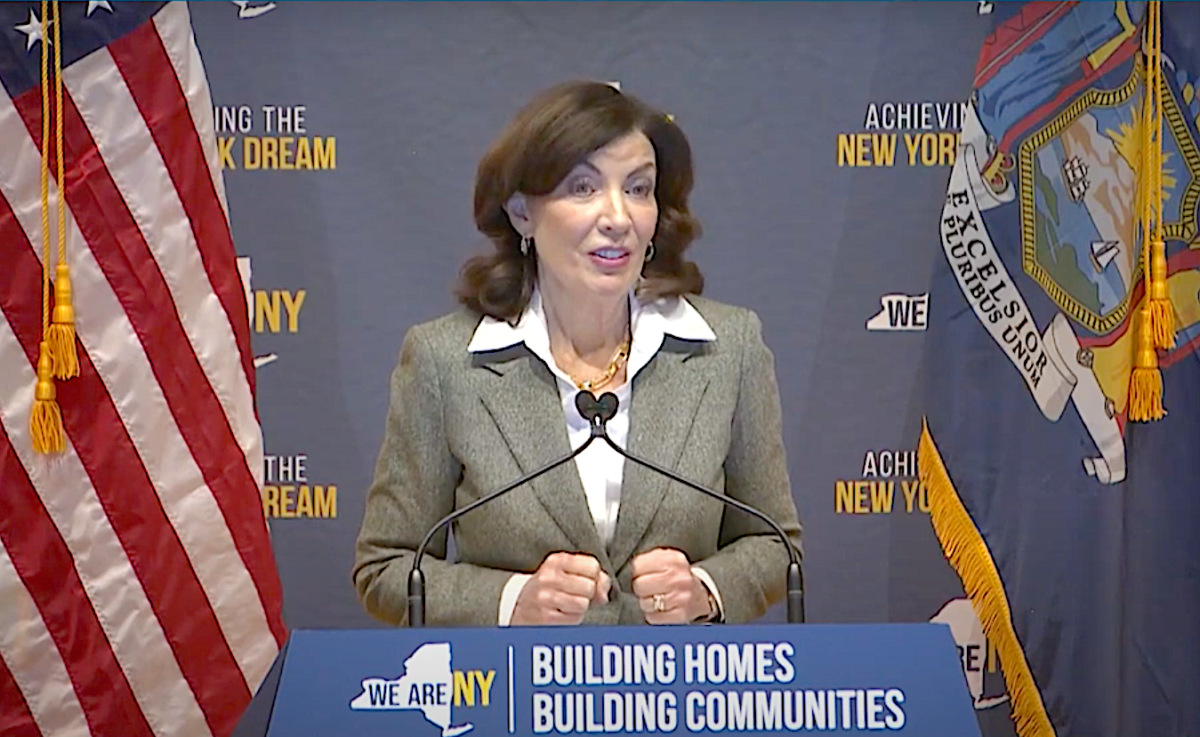Gov. Kathy Hochul was in Westchester this afternoon for a community roundtable with elected officials and representatives of various organizations from across the Hudson Valley to discuss the New York Housing Compact, her proposal to build 800,000 new homes in New York over the next ten years. The event was hosted by the Business Council of Westchester (BCW) at 800 Westchester Ave. in Rye Brook, where it has its headquarters.

Hochul’s roundtable today came after a letter had been sent to her on Feb. 28 and was made public by the Housing Subcommittee for the Westchester Municipal Officials Association. In it, more than two dozen mayors or town supervisors asked for changes in the Housing Compact she had proposed. Among the elements they wanted to see changed was a provision that would override local zoning and allow for more transit-oriented development. They also said Hochul’s plan did not offer enough in the way of funding to cover new infrastructure costs that would result from the construction of additional housing.
While not directly mentioning the letter, Hochul said that when she hears from communities saying ‘”we don’t want to be told what to do,” she understands the sentiment.
“I’m saying do what you want to do. Just grow, ” Hochul said. “Go any place you want to go. Transit-oriented development. The most common sense thing in the world is to build housing right near where the train station is.”
Marsha Gordon, BCW’s president and CEO, told the meeting that Hochul’s plan directly confronts the critical issue of housing.
“Westchester County and New York state residents suffer from a chronic and growing shortage of workforce housing,” Gordon said. “Employers cannot compete to attract and retain talent for their workforce without attractive housing opportunities available to its prospective employees. This housing crisis threatens our economic future.”
Westchester County Executive George Latimer said, “We agree with the governor that we need to provide more housing units in Westchester as part of the overall statewide need. Our task is to work closely with our local governments, using the tools available, to achieve these goals.”
White Plains Mayor Tom Roach, New Rochelle Mayor Noam Bramson, Peekskill Mayor Vivian McKenzie, Newburgh Mayor Torrance Harvey, Middletown Mayor Joe DeStefano and Kingston Mayor Steve Noble were among those coming out in favor of Hochul’s Housing Compact.
Hochul said that her 14 years of experience as an elected local official taught her that one of the ways even good projects can be stopped is through zoning.
“Guess what. Zoning isn’t permanent. It isn’t in the New York State Constitution,” Hochul said. “Communities have the power to change it, so open up your zoning. Allow for downtown housing that doesn’t have to have so many parking spaces because that’s a barrier. Open it up. Open it up.”
Hochul said there are environmental benefits to higher density housing, especially near a commuter train station.
“What we’re seeing with Mother Nature and our moral imperative to reduce greenhouse emissions and carbon emissions, the fewer cars that are on the road, it’s better for our planet, our communities and our kids’ future,” Hochul said. “So, you put housing right there where someone can get that cup of coffee going out the door and get that train going to a job.”
Among the organization leaders supporting Hochul’s Housing Compact were: Michael Romita, president and CEO of the Westchester County Association; Pace University President Marvin Krislov; Tim Foley, CEO of The Building and Realty Institute of Westchester; John Cooney, executive director of the Construction Industry Council of New York; and Mike Oates, president and CEO of the Hudson Valley Economic Development Corporation.





















